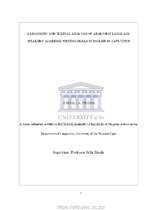A Linguistic and textual analysis of Arab first language speakers’ academic writing skills in English in Cape Town
Abstract
Research on EFL students has received increased interest in recent years (Elachachi, 2015; Al- Zubaidi, 2012; Awad, 2012; Eldokali, 2007; Wahba, 1998). Although much research attention has focussed on the EFL classes and practices, very little research has focussed on the Arab students and the resources used for teaching them English abroad. In particular, the linguistic and cultural barriers Arab students face when seeking higher education in a foreign country, in this case South Africa, where they have minimal to no exposure to the language of instruction used by the host institution, have not received much attention. The study investigated the academic writing skills in English of Arab students and evaluated the efficacy of the EFL teaching materials used at selected English schools in Cape Town for those intending to study in South Africa. The researcher did a text-based analysis on written essays by the Arab students, using Systemic Functional Linguistic (SFL) as a theoretical and analytical framework. The study also evaluated course books used by private language schools to teach EFL students in Cape Town. The textbooks were analysed by means of Multimodal Discourse Analysis (MDA, an offshoot of SFL to explore the
different modes used in the teaching material as aspects of cultural social semiotics. It was found that the selected course books used in Cape Town language schools were focusing on teaching conversational English rather than written academic English, which was critical for essay writing required at tertiary level education. The essays showed that Arab students writing lacked in English academic writing conventions, and often resorted to adopting and adapted their first language style, which often led to unsatisfactory writing. Thus, it was concluded that the schools did not adequately prepare the students to face the academic requirements at institutions of higher learning. The study recommends a number of pedagogical measures on how to improve academic writing, as well as infusing Arabic cultural modes in the teaching material to contextualise learning and aid meaning making and consumption.

